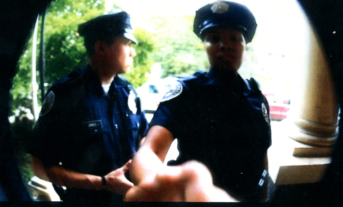1. Stay Calm/Stay Safe
The key to any citizen/police encounter is to stay calm and stay safe. Getting stopped or approached by a police officer can be a nerve-racking experience. In fact, you often hear police officers ask people “why they are so nervous?” If you are stopped by the police officer, do not panic and do not do anything stupid (like try to flee, start hiding stuff in your car or throwing it out the window, or fight with the police). Instead, if you are the driver of a car, pull over immediately. Once you are pulled over, place your hands on the top of the steering wheel and leave them there until the officer has approached the side of your car and can see them. If a police officer sees you moving in your car or reaching for things, the officer will automatically think that you are either hiding contraband or reaching for a gun. This happened recently in South Carolina when a police officer instructed a man who had just stepped out of his car to “show his license.” When the man reached back into his car to get his license, the officer shot him several times; the officer’s excuse was that he thought the man was reaching for a gun. If you need to get something or reach for something, ask the officer for permission before you act. Be polite and respectful to the officer even if you do not think you did anything wrong. It is true that police officers often stop people for no reason or without legal justification. Even in this circumstance, it is not going to be helpful to argue with the officer. Arguing with a police officer is like arguing with a referee or umpire; you are not going to win the argument, the officer is not going to change his decision and unlike a referee or umpire, who can throw you out of a game, the officer can simply arrest you. Your lawyer will ultimately be the person who argues for you in court. If the officer made a mistake or treated you unfairly, let your lawyer deal with it as your lawyer can actually “win that argument” in court.
2. Know the Situation You’re In/Are you being detained or are you free to leave?
There are three different levels of citizen/police encounters. The two that are important for this topic are the Tier 1 & Tier 2 encounters. A Tier 1 encounter is called a voluntary encounter in which a police officer can approach you and ask you questions without any belief that you committed a criminal act; you can walk away from a Tier 1 encounter at any time. The problem is that a police officer will never tell you that he is conducting a voluntary encounter and that you have the right to walk away unless you ask. So, if you are approached by a police officer, even before start answering questions (which we discuss in the “You have the Right to remain silent” section of this guide), you should ask the officer whether you are being detained or whether you are free to leave. If the officer says you are free to leave, then you know you can go. A Tier 2 encounter is often referred to as an investigatory stop and typically occurs when you are driving and pulled over. In a Tier 2 encounter, the officer may stop or detain you based on a reasonable articulable suspicion, which means that there is some objective evidence that you may have committed a crime. However, just because the officer has the right to stop or detain you does not mean that you are required to answer questions and incriminate yourself. Again, since an officer is not going to volunteer whether he is conducting a Tier 1 or a Tier 2 encounter, ask the officer if you are free to leave. As we know from the Tier 1 situation, if he says yes, then you can leave. If he says no, then if and when the case goes to court he will have to prove that he had enough evidence to detain you.
Police questioning is legally broken down into three categories. Each type of police questioning provides different rights and obligations to you and the police officer. The three types of police questioning are explained below.
– Consensual “Voluntary” Encounters – these encounters are consensual, they can be ended at any time, and the person questioned cannot be searched by the officer
– Investigative Detentions (aka “Terry Stops”) – during investigative detentions, the person cannot leave immediately, but the encounter is brief, typically within 20-30 minutes, and the person can be frisked
– Arrests – in cases of arrest, the person’s rights are much more limited: the person can be frisked, forced to show ID, and even taken to jail depending on the circumstances
An officer needs a certain level of evidence before engaging in investigative detentions or arrests. An officer cannot detain a suspect without “reasonable suspicion.” Be careful, because what may seem unreasonable to you is more likely to be considered reasonable under the law. Even common behaviors may be grounds for reasonable suspicion, and courts typically side with the officer when there is a question about it.
If the officer is going to arrest you or perform a search of you or your car, there must be “probable cause.” This is a more demanding standard, but is still easier for an officer to meet than most people think. It’s hard to know what level of evidence the officer might have against you, so if you are being questioned by the police it’s a good idea to ask why!
3. Ask if You’re Free to Leave
Most avoidable arrests are due to trickery and intimidation by the police. Police do not have to be honest with you all the time. They often pretend they saw you do something in hopes that you will confess or consent to a search. Although the police can be very crafty, they have to respond honestly if you ask if you are free to leave.
An officer cannot prevent you from leaving (i.e. turning a voluntary encounter into a non-consensual one) without having the right level of evidence – either reasonable suspicion or probable cause. If there isn’t enough evidence to meet either of these standards, then any evidence that is found will be excluded from court as unconstitutional. So if the officer says you are free to leave, you might want to do so.
4. Ask if You’re Under Arrest
If you are not allowed to leave, this should be your next question. Remember that under an investigative detention, you still have many more rights than if you were under arrest. Arrest is the worst case scenario. If the officer has probable cause to arrest you, there is likely probable cause for search warrants, so if something is hidden then it will likely be found soon.
5. Excercise your right to remain silent
Except for identifying yourself, you have the right to remain silent. You have that Right even if the officer does not inform you of that Right (which typically is not required unless your are under arrest and being interrogated). What that means is that you do not have to answer the police officer’s questions, which are designed to get you to incriminate yourself. For example, if you are stopped and the officer asks “have you been drinking?” instead of answering “no” or “yes, but I only had two beers” you can simply answer, “officer I would rather not answer that question or any other question you intend to ask me.” Many people are afraid to give that answer because they believe it will make the officer mad; however, all you are doing is exercising your Constitutional Rights and protecting yourself from making an incriminating statement, which is all that the officer is trying to get you to do. Let the officer be mad at you for exercising your Constitutional Rights; that is better than you getting mad at yourself after you made an incriminatory statement and end up arrested. Many people ask, “but then won’t the officer think I am guilty?” Again, who cares what the officer thinks. It is better for the officer to think you are guilty for not making a statement, than to know you are guilty after you have either lied to him or made an incriminatory statement. Finally, it is a misconception that the officer’s failure to inform you that you have the Right to remain silent will result in your case being dismissed. That rarely, if ever, happens.
6. Do Not Agree to Any Type of Search/Do Not Sign Any Statement
If you are being accused of a crime, do not give or sign a statement without first consulting an experienced criminal defense lawyer. Even if you cannot afford to hire a lawyer, ask to have a lawyer present to help you understand your Constitutional Rights. Do not sign a statement you did not write. Do not sign a statement you did not read. Do not sign a statement you do not understand.
No matter what the situation is, if you consent to something the officer will have more rights. An officer that comes into your home with your consent has basically the same rights as your mother-in-law coming for a visit. Once they are given that inch, it often become a mile.
If you give your consent, an officer might then observe something that could raise the evidence level against you to reasonable suspicion or even probable cause. That’s why in order to reduce the likelihood of a preventable detainment or arrest, you should avoid voluntarily consenting to anything. No matter what the officer says, you don’t have to consent.
7. DO NOT Talk Too Much
You don’t have to say anything either. As the saying goes, “anything you say can be used against you in a court of law.” In most situations, the less you talk the better.
Officers are often very good at wrangling some kind of half-baked confession out of you that could raise the evidence level up a notch. Don’t fall for it. If you want to respond, keep it short. If you are worried or anxious, or you suspect the officer is digging for something, just stay quiet. People often talk their way right into a jail cell.
8. Understand Common Police Questioning Tactics
Police are trained to question citizens and most police departments share training materials and use similar methods. Although the techniques are clever, you’ll likely run into the same techniques no matter where you are, so it’s wise to familiarize yourself with them beforehand. Here are some of the classic methods:
Officers will tell you they have incriminating evidence against you, even when they don’t (e.g. “We have witnesses who claim they saw X, Y, and Z”). Don’t believe them, especially if you’ve done nothing wrong.
Officers will try to get you to consent to a search or to provide information. Consenting to a search or giving them too much information will not improve your position. It can only hurt you. If they have other evidence, they have it. Consenting won’t take that evidence away, it can only increase the amount of evidence against you.
Officers will try to lure you in with bribes if you give consent to a search or provide information (e.g. “Help me help you” or “You want to be on our side here.”). Legally, they can’t promise you leniency. It’s just an attempt to trick you, and if you listen closely you’ll notice that they don’t clearly promise anything. They simply imply some leniency or favorable treatment, and anxious citizens often comply, thinking they will end up in less trouble. Oftentimes, that isn’t actually the case. You’re better off just staying silent or asking to leave.
Officers frequently tell you that silence or refusal to consent is incriminating (e.g. ”Not answering is suspicious, why are you resisting?”). This is not incriminating. These are protected rights and you are able to freely exercise them. Respectfully tell the officer that.
Finally, officers will frame questions in order to get quick, subtle consent. (e.g. “Ok not a problem, you don’t mind if I look around then?”) Questions that seem casual and offer only yes or no answers can be dangerous because people often don’t know they’ve given voluntary consent until the officer has found something. Remember, you can revoke your consent or clarify your lack of consent, but you can’t go back in time and prevent the officer from finding something you would rather keep hidden.
9. Lawyer Up
The laws regarding police questioning and investigations are complicated and the stakes can be very high. If you were arrested or experienced other negative consequences as a result of police questioning, it’s highly recommended that you consult with a qualified lawyer to analyze your case.r






















